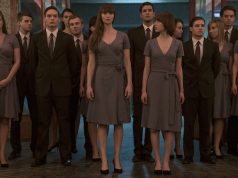
Once you get past the initial disappointment of “A Bigger Splash” not being the long-awaited sequel to “Splash,” it’s a well-crafted piece of understated adult drama. Directed by Luca Guadagnino (“I Am Love”) as a loose remake of the 1969 French film “La Piscine,” it’s built around a steamy mixture of jealousy and miscommunication among lovers and former lovers, all set on a picturesque Italian island that is a playground for attractive, wealthy people. As is often the case with movies about the upper crust, we grow increasingly less envious of them as the story progresses.
We meet Marianne Lane (Tilda Swinton), an international rock star who has come to a villa here with her photographer boyfriend, Paul (Matthias Schoenaerts), to spend a couple weeks recovering from a voice-related surgery. Marianne can’t (or shouldn’t) talk except for an occasional whisper, so it’s a peaceful vacation, marked by nude poolside lounging and frequent doin’ it.
But they are soon joined by Harry Hawkes (Ralph Fiennes), a glad-handing rake of a music producer who was Marianne’s lover for several years, who in fact introduced her to Paul after their own affair was over. (“He doesn’t believe in limits,” Marianne says of Harry.) Harry’s accompanied by Penelope (Dakota Johnson), his gorgeous 22-year-old daughter whose existence he learned of only recently. She’s a bit reserved — aloof, maybe? Or disapproving? — but Harry is boisterous and gregarious enough for both of them. Marianne and Paul graciously accept their visitors, then quietly make fun of them in the privacy of their own bedroom, as couples do.
Guadagnino, working from a screenplay by David Kajganich (“True Story,” “The Invasion”), smoothly provides enough details, including brief flashbacks, to give us a sense of the well-established relationships between Marianne, Paul, and Harry. With this foundation in place, we can appreciate the nuances of how they all interact now, both as a group and in one-on-one situations, as they lounge around the island, eating, drinking, and swimming. Harry clearly still has feelings for Marianne that he hides under a veneer of jokes and stories. Paul doesn’t feel threatened, though; he’s secure in the knowledge that Marianne loves only him. Penelope is the wild card, an unknown element who flirts with Paul, earns Marianne’s mistrust, and seems to attract the gaze of her own father (not that this is her fault, mind you).
This low-simmering drama — flirtations, rebukes, reminiscences, and accusations — lasts for about two-thirds of the movie, progressing at an unhurried (but not “slow”) pace, gradually getting warmer as we enjoy the beautiful scenery and the scintillating conversation. Marianne’s temporary muteness is a literal manifestation of the larger theme: each of these people is unable or unwilling to communicate honestly with at least one other person, leading to all sorts of trouble. When it eventually comes to a head, the story takes a melodramatic turn that is something of a mixed blessing. On one hand, it’s a rather tawdry shift from the internal conflict we’ve been witnessing. On the other hand, a burst of action and intrigue can be welcome in a movie that’s otherwise mostly talk.
Tilda Swinton, a mystical creature who in a better world would play the lead in a David Bowie biopic, is well cast as an aging but vibrant rock star, captivating even without speaking. Matthias Schoenaerts, a Belgian actor last seen in “The Danish Girl,” has a quiet confidence that suits Paul, especially in contrast to Ralph Fiennes’ giddy, cavorting, frequently nude Harry. And Dakota Johnson continues to prove she’s better than the film that made her famous (“Fifty Shades of Grey”), giving a playful, enigmatic performance as Penelope. It’s sturdy, steamy entertainment for grown-ups, and not a mermaid in sight.
B (2 hrs., 5 min.; )





